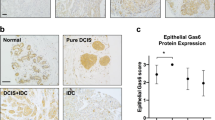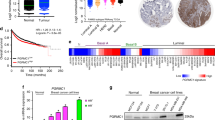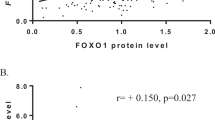Abstract
In this study, we used immunohistochemical and biochemical analysis to show that gp200-MR6, a 200 kDa molecule that is functionally associated with the human interleukin 4 (IL-4) receptor complex, is expressed at high levels on normal breast epithelial tissues, at lower levels on in situ carcinomas, and that the expression is lost in the invasive carcinoma of the breast. Furthermore, a preliminary study showed that benign epithelial hyperplasia of the breast expresses the gp200-MR6 heterogeneously. Two populations of cells have been observed: MR6 positive and MR6 negative. Interestingly, MR6-positive cells were observed to have different morphology from those that were MR6 negative; the nuclei of the former were larger and rounded in shape, whereas the nuclei of the latter were relatively small and oval in shape. In sodium dodecyl sulphate polyacrylamide gel electrophoresis (SDS-PAGE) and Western blotting, monoclonal antibody MR6 detects the same molecular weight molecule in both normal and transformed tissue, indicating that the molecule is not a product of a truncated gene. The intensity of the gp200-MR6 bands correlates with the immunohistochemical data, indicating that the molecule is expressed at high levels in normal tissue and at lower levels in malignant tissue. These results suggest that analysis of gp200-MR6 expression may be useful in tumour grading and prognostic evaluation in breast cancer. Moreover, the molecule may be involved early in the process of tumorigenesis of the breast, in which a loss or a down-regulation of gp200-MR6 could contribute towards tumour development and progression via an effect on cell growth and differentiation.
This is a preview of subscription content, access via your institution
Access options
Subscribe to this journal
Receive 24 print issues and online access
$259.00 per year
only $10.79 per issue
Buy this article
- Purchase on Springer Link
- Instant access to full article PDF
Prices may be subject to local taxes which are calculated during checkout
Similar content being viewed by others
Author information
Authors and Affiliations
Rights and permissions
About this article
Cite this article
AL-Tubuly, A., Luqmani, Y., Shousha, S. et al. Differential expression of gp200-MR6 molecule in benign hyperplasia and down-regulation in invasive carcinoma of the breast. Br J Cancer 74, 1005–1011 (1996). https://doi.org/10.1038/bjc.1996.481
Issue Date:
DOI: https://doi.org/10.1038/bjc.1996.481



